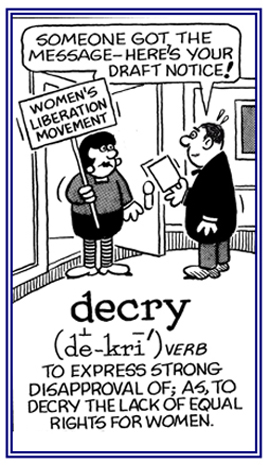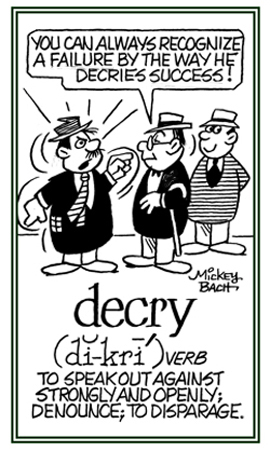de-
(Latin: from, away from, off; down; wholly, entirely, utterly, complete; reverse the action of, undo; the negation or reversal of the notion expressed in the primary or root word)
1. An order with the power of legislation that is declared by a ruler or another person or group that has government authority: The decrees that abolished slavery were meant to establish the foundations of a nation committed to equality for all people.
2. A ruling that is given by a court or legislature regarding legal actions: The state government sent out an official decree that any foreign immigrants who wanted to live and work in California had to have a legal passport.
2. A ruling that is given by a court or legislature regarding legal actions: The state government sent out an official decree that any foreign immigrants who wanted to live and work in California had to have a legal passport.
1. To proclaim, to declare, or to pronounce something by an authority.
2. A statement presented by a court of law regarding a legal action.
3. Etymology: used since 1303, from Old French decre, a variant of decret; from Latin decretum, neuter of decretus, from decernere, "to decree, to decide, to pronounce a decision"; from de-, "down" + cernere, "to separate".
2. A statement presented by a court of law regarding a legal action.
3. Etymology: used since 1303, from Old French decre, a variant of decret; from Latin decretum, neuter of decretus, from decernere, "to decree, to decide, to pronounce a decision"; from de-, "down" + cernere, "to separate".
decrepit (adjective), more decrepit, most decrepit
1. Weakened, worn out, impaired, or broken down by old age, illness, or hard use.
2. In poor condition; especially, as a result of being old, overused, or not working efficiently.
3. Etymology: from Middle French decrepit, from Latin decrepitus, from de-, "down" + crepitus, from crepare, "to crack, to break".
2. In poor condition; especially, as a result of being old, overused, or not working efficiently.
3. Etymology: from Middle French decrepit, from Latin decrepitus, from de-, "down" + crepitus, from crepare, "to crack, to break".
decrepitate (verb), decrepitates; decrepitated; decrepitating
1. To heat a substance; especially, a salt, until it crackles or stops crackling, or to be heated in this way.
2. To roast or to calcine (crystals or salts) until they emit a crackling sound or until the crackling stops.
3. To make a crackling sound when roasted.
2. To roast or to calcine (crystals or salts) until they emit a crackling sound or until the crackling stops.
3. To make a crackling sound when roasted.
1. The crackling or breaking up of certain crystals when they are heated.
2. The sharp sound of snapping noises; such as, the crackling and the snapping of certain salts when heated.
3. The breaking up of mineral substances when exposed to heat; usually, accompanied by a crackling noise.
2. The sharp sound of snapping noises; such as, the crackling and the snapping of certain salts when heated.
3. The breaking up of mineral substances when exposed to heat; usually, accompanied by a crackling noise.
The quality or condition of being weakened or worn out from age or wear.
1. The quality or condition of being weakened, worn out, impaired, in poor working order, or broken down by old age, illness, or hard use: Henry realized that decrepitude was creeping into his life even more at the age of 75 because he had to wear a hearing aid and stronger glasses, he needed a cane for walking, and he had uncontrollable arthritis in the joints of his elbows, fingers and knees.
2. Etymology: from Latin decrepitus (de- + crepitus from crepare, "to crack, to break" + -tude, "quality, condition of"
2. Etymology: from Latin decrepitus (de- + crepitus from crepare, "to crack, to break" + -tude, "quality, condition of"
1. In the Roman Catholic Church, a decree; especially, a papal letter giving a decision on a point or question of canon law.
2. Etymology: Middle English, from Old French decretale, previously from Late Latin decretalis, "fixed by decree", from Latin decretum, "principle, decision".
2. Etymology: Middle English, from Old French decretale, previously from Late Latin decretalis, "fixed by decree", from Latin decretum, "principle, decision".
decrown (verb), decrowns; decrowned; decrowning
decry (verb), decries; decried; decrying
To denounce openly and publicly that something is harmful, bad, wrong, etc.: Violence on TV is generally decried as being harmful to children.

© ALL rights are reserved.

© ALL rights are reserved.
Go to this Word A Day Revisited Index


Go to this Word A Day Revisited Index
so you can see more of Mickey Bach's cartoons.
decrypt
decrypt (verb), decrypts; decrypted; decrypting
1. To solve (a cryptogram) without knowledge of a key.
2. To convert (a cryptogram) into plaintext with proper application of a key.
2. To convert (a cryptogram) into plaintext with proper application of a key.
decryption
dedicate (verb), dedicates; dedicated; dedicating
1. To give up earnestly, seriously, or wholly, to a particular person or specific purpose: The orchestra dedicated all of their evenings practicing their new compositions for the concert.
2. To inscribe or to address a book, an engraving, a piece of music, etc. to a patron or a friend, as a compliment or a mark of honor or affection: Joy Fielding dedicated her book Heart Stopper to Shannon Micol, a person whose music inspired her very much.
3. To set aside, to specify, or to preserve for a specific purpose: The money that the city received was dedicated to building a much-needed bridge.
4. To open formally to the public; to inaugurate or to make public: The children played baseball in the city park which was recently dedicated by the mayor.
5. Etymology: from de-, "utterly, completely" and dicare, "to proclaim, to tell, to say".
2. To inscribe or to address a book, an engraving, a piece of music, etc. to a patron or a friend, as a compliment or a mark of honor or affection: Joy Fielding dedicated her book Heart Stopper to Shannon Micol, a person whose music inspired her very much.
3. To set aside, to specify, or to preserve for a specific purpose: The money that the city received was dedicated to building a much-needed bridge.
4. To open formally to the public; to inaugurate or to make public: The children played baseball in the city park which was recently dedicated by the mayor.
5. Etymology: from de-, "utterly, completely" and dicare, "to proclaim, to tell, to say".
1. The giving up or devoting (of oneself, one's time, labor, etc.) to the service of a person or to the pursuit of a purpose: It is said that dedication and imagination are two very important components to accomplish a goal.
2. The official statement at the beginning of a song or a book, for example, to show the devotedness for a particular person: The book The Ra Expeditions by Thor Heyerdahl has a very short and precise dedication: "To Yvonne"!
3. The act of the authorized opening of a building, a highway or a swimming pool for public use: The dedication of the first swimming pool in Sally's town took place in the summer when it was very warm and the public could use it right away.
4. An act or process of setting something aside for a particular purpose; especially, in a ceremony that achieves this: The dedication service at the new church showed the commitment of its members to have their place of worship.
2. The official statement at the beginning of a song or a book, for example, to show the devotedness for a particular person: The book The Ra Expeditions by Thor Heyerdahl has a very short and precise dedication: "To Yvonne"!
3. The act of the authorized opening of a building, a highway or a swimming pool for public use: The dedication of the first swimming pool in Sally's town took place in the summer when it was very warm and the public could use it right away.
4. An act or process of setting something aside for a particular purpose; especially, in a ceremony that achieves this: The dedication service at the new church showed the commitment of its members to have their place of worship.


